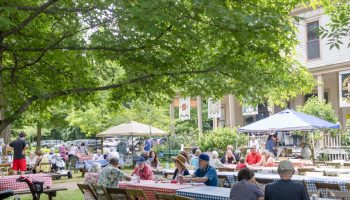As a relatively new Chautauquan myself, this past week gave me greater insight and hope on how Chautauqua can model a different path forward when it comes to controversial subjects. Last year, a few Chautauquans expressed concerns about a drag show on our grounds. Some of the feedback was generally based on a lack of understanding about the connection and significance of drag to LGBTQ history. In the absence of that understanding, some folks may not have fully understood the historical and contemporary relevance of drag as a performance art. For this reason, and based on requests we received from members of the Chautauqua community who wanted to understand more, we organized an educational lecture to open a dialogue.
Many Chautauquans, including those who were ambivalent about drag, showed up to a packed Smith Wilkes Hall this past week to hear Ms. Gloria Swansong’s lecture on “LGBTQ History: Drag as Performance Art.” The audience members asked thoughtful questions, and the result was an engaging dialogue. The lecture seems to have convinced a diverse cross section of the audience to see a professional drag show. The LGBTQ and Friends Community Group held a drag show at Norton Hall that same evening, and not only did the show sell out, they had to turn away over 100 people at the door. What was even more impressive was the extremely diverse audience by age, race, sexuality and gender. Just like we did at the ABBA concert, both 18-year-old and 88-year-old Chautauquans found common joy in yet another art form.
I would like to note that this sort of disagreement is not new for Chautauqua. In 1979, when we had the first production of Equus, there was controversy about nudity as part of that performance, along with plays offered that same season that had “strong language and adult homosexuality.” One reviewer wrote the following: “No one has to like these three plays. And no one has to approve of their language, nudity and homosexuality. But no one ought to dismiss them, out of hand, just on account of the controversial content, because the plays are serious statements about life, society and the human conditions as found today, and ought to be judged by how much light they throw on the subjects they address.”
The arts have always pushed boundaries for society, and new art forms did not come to Chautauqua easily. To learn more about Chautauqua’s struggles with theater, dance and jazz coming to the grounds, I recommend that you look at one of archivist Jon Schmitz’s digital contributions to the Heritage Lecture Series on “Entertaining Gate Crashers — How Theater, Dance, and ‘All That Jazz’ Made it on to the Chautauqua Platform” on CHQ Assembly. Yes, at one point, theater as an art form was offensive — even blasphemous. Where would we be today without the Chautauqua Theater Company, or without jazz performers like Wynton Marsalis?
All of this is to say that we have been here before, and we will experience contention again. Some Chautauquans worry that we might be moving too fast. Others feel that we are long overdue for changes and that we are not adapting quickly enough. Our strategic plan clearly outlines this tension as part of our shared values: “A balance between Chautauqua’s heritage and the need to innovate.” How then, do we strike the right balance? How do we lean into change without destroying our traditions? How do we engage in dialogue without casting aspersions when we disagree?
There are some important lessons to be learned from this instance. The chance to hear a different perspective and to be in dialogue seems to have created greater understanding; empathy for someone else’s history may help us understand their reality today. Chautauquans came to the lecture and listened with good intent and open hearts and minds. Not everyone might agree that drag belongs on our grounds, but they have more information on why others might feel differently.
We could have handled this issue as a community exactly how our larger society generally deals with controversy — by not engaging in dialogue. We could have gone back to our camps. We could have drawn lines based on our existing beliefs and understanding. We could have demonized the “other.” But, as a community, we made a conscious choice to listen, seek understanding and build empathy. That, my friends, is no small feat. Could this be our secret ingredient to change the brokenness of our world? It gives me hope that Chautauqua might illuminate this as an alternative path forward for us and the rest of society.
Amit Taneja
Senior Vice President & Chief IDEA Officer





